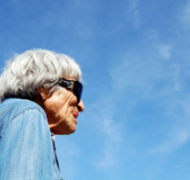Aging Well with Dr. Dan Blazer, Part 2: Successful Aging
Blog / Produced by The High Calling
In his 2002 book, Depression in Late Life, Laity Leadership Institute Senior Fellow Dan Blazer, M.D. retells a story from the life of Siddhārtha, who would come to be known as the Supreme Buddha. The young prince left his palace one day and came across a “tottering, wrinkled, white-haired, decrepit old man who was bent over, trembling, and mumbling something incomprensible while he tottered along, balanced by a stick he used for a cane.” Seeing this sight, Siddhārtha is said have told his chariot driver, “It’s the world’s pity, that weak and ignorant beings, drunk with the vanity of youth, do not behold old age. Let us hurry back to the palace. What is the use of pleasures in life, since I myself am the future dwelling-place of old age?”
The perception of old age as a depressing season of life, however, is not confirmed in scientific studies of the elderly, Blazer concluded. Instead, studies consistently show that only about 15 percent of older adults exhibit depressive symptoms. When The High Calling spoke with Blazer this fall, he said two foundations of doing well mentally in late life are having good physical health and having good cognitive health. We don’t have absolute control over these areas, he said, but there are things we can do to ensure good mental health as we age.
“In terms of cognitive impairment, experts talk about things like having a good education, continuing to keep your mind active, reading, and continuing active social engagements to decrease risk of developing conditions like Alzheimer’s Disease. Taking statins to control blood pressure and cholesterol can also reduce risk, but how much, we don’t know,” said Blazer.
“Physical health is another issue entirely,” he said, “because there’s a lot we can do to improve our physical health, but preventive measures need to be taken earlier in life, and often the earlier the better.”
Diet, exercise, keeping mentally alert, staying active, and taking care of health problems early are all important contributors to good physical health. Another is access to medical services. In the United States, Medicare is a major equalizer for the elderly, Blazer said, because it is the payment foundation for geriatric medical services and it provides relatively equal coverage.
“In one study, we compared Durham County, North Carolina, with four counties that are just northeast of here. In any one of those counties, a person would be within an hour’s drive of a major medical center either here in Durham, in Chapel Hill, or in Raleigh. In this area, blacks and whites, rich and poor all have pretty well equal access to medical care. I think Medicare probably was responsible for that,” he explained.
Retirement planning is another important factor in protecting mental health in old age.
“Don’t retire too early, or if you’re going to retire, retire to something that you really enjoy doing. We used to say: Don’t just go out and sit in a rocking chair because you may have a very long rock. Staying active is one of the best things you can do to maintain your mental health,” said Blazer.
Preparing to deal with loss is also an important step in protecting mental health.
“If you’re married and in your 70s, you need to be prepared for the fact that your spouse may die before you. If you’ve been a close couple, the grief is going to be really tough. But you need to think about where you will live, what kind of social network you’ll try to maintain, what kind of activities you’ll try to do in the event of your spouse’s death. You don’t need to dwell on that, but you at least need to think it through a bit,” Blazer advised.
It’s important to avoid making hasty decisions too in late life. For example, moving to Florida right after you retire is probably not a good idea, because you need to give yourself time to see how you are going to adjust to retirement, Blazer said. Likewise, if your spouse dies, it’s not wise to remarry six months later.
“Take your time making life-altering decisions,” he said.
"Successful aging has been associated with both participation in faith community activities (such as church attendance) and self perception of spiritual wellbeing,” Blazer said.
In studies he and his colleagues performed more than 30 years ago, they found that "though participation may decline (probably due to poor health), religious attitudes and beliefs do not change among the elderly as they enter late-late life if they remain cognitively intact." The challenges of aging can, however, alter the nature and quality of their religion/spirituality, he said.
So, if we assume, as Siddhartha did, that finding pleasure in life is futile because old age is going to be a physically, spiritually, and mentally crippling time, we may just fulfill that assumption. But, if we take care of our bodies, spirits, and our minds as we age, and if we carefully plan for the inevitable losses we will face, we may just find ourselves outsmarting the vanity of youth and enjoying our later years.
We’d love to hear your ideas for successful aging. Please share them with us in the comments section.
Image by Emiliano. Used with permission. Sourced via Flickr. Post by Christine A. Scheller.
Laity Leadership Institute senior fellow Dan Blazer, M.D., PhD. is vice chair of faculty in the Department of Psychiatry and Behavioral Sciences and Vice Chair of academic development at Duke University Medical Center in Durham, North Carolina. Dr. Blazer is a geriatric psychiatrist and an epidemiologist, and is the author of numerous books. He is also co-editor of Essentials of Geriatric Psychiatry, which is scheduled for release in 2012.





